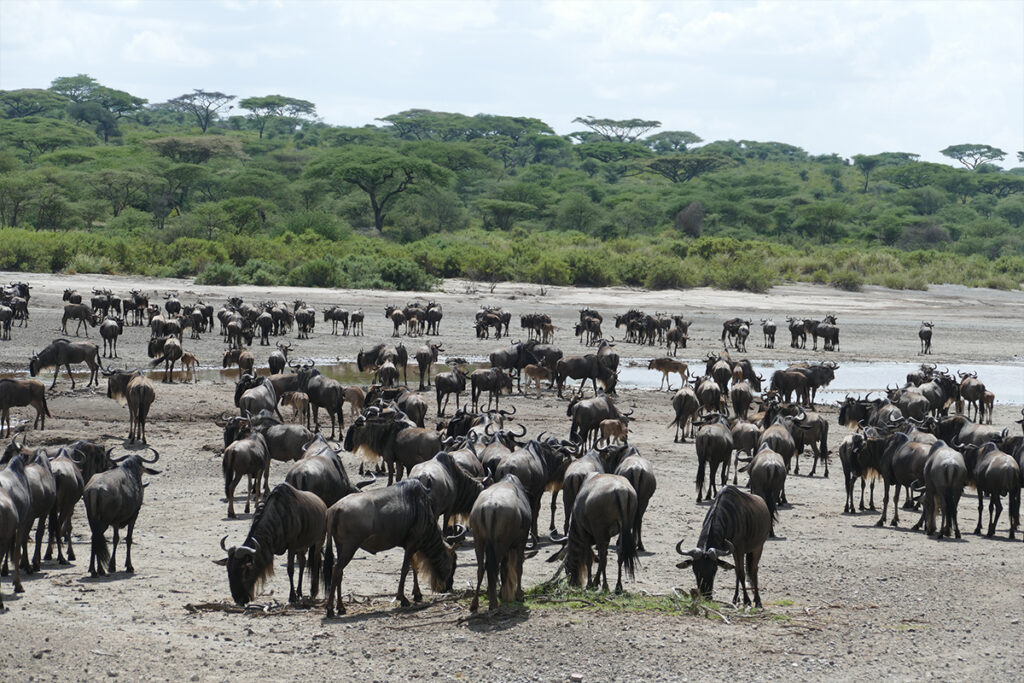Over 99% of Tanzanians speak Swahili as either their first or second language. With the Tanzania population standing at approximately 62 million, this enthusiasm for Swahili makes it one of the most spoken languages in Africa. It’s fascinating how this Bantu language evolved to become the glue that binds the country’s diverse ethnic groups.
Historically, Swahili’s emergence as the national language can be tracked back to the post-colonial era when the government recognized its unifying power. Swahili is not just limited to daily conversations; it is the medium of instruction in schools and is the primary language in the judicial system. Recent data even indicates that its usage is expanding beyond African borders, amplifying Tanzania’s linguistic influence globally.

Overview of Languages Spoken in Tanzania
Tanzania is a linguistically diverse country with over 120 languages spoken. The two official languages are Swahili and English. Swahili, known locally as Kiswahili, is the national language and is widely spoken across the country. English, although not as commonly spoken as Swahili, remains an important language used in government, business, and education. These two languages play pivotal roles in uniting the nation and facilitating communication.
Swahili serves as the lingua franca, bridging various ethnic groups. It’s used in schools, on the streets, and in the media. Its simplicity and widespread use have made it the language of choice for everyday interactions. Additionally, Swahili is one of the easiest African languages for non-native speakers to learn, contributing to its popularity. Visitors to Tanzania will find themselves quickly picking up basic Swahili phrases.
English, on the other hand, is primarily associated with formal settings. It’s used in higher education, legal proceedings, and international business. While not used in daily conversations by most Tanzanians, it holds significant value for career advancement and global communication. Schools teach English from an early age, ensuring that students become proficient by the time they reach higher levels of education.
Tanzania’s other languages include numerous indigenous tongues reflecting the country’s cultural diversity. These indigenous languages are spoken within ethnic communities and often passed down through generations. Despite the dominance of Swahili and English, these local languages still play a crucial part in preserving Tanzania’s rich cultural heritage. Respecting and maintaining this linguistic diversity is essential for the nation’s cultural identity.
The Role of Swahili and English in National Communication
Swahili is the heart of communication in Tanzania. It is widely spoken in homes, schools, and the market. This language, with its simple structure, helps in breaking down cultural barriers among different ethnic groups. Swahili is not only a means of daily conversation but also a symbol of national unity. Its role extends beyond Tanzania, influencing neighboring countries as well.
English, although secondary, plays a crucial role in formal and international communication. It’s the primary language used in legal and business settings. Schools incorporate English into their curriculum, making it a significant part of higher education. This dual-language approach equips Tanzanians with the skills needed for global interactions. Businesses also benefit, as English is essential for international trade and relations.
- Education: English is the medium of instruction in higher education.
- Government: Swahili is used in most government communications.
- Media: Both languages are used in national broadcasting.
Combining Swahili and English creates a balanced communication system. While Swahili addresses local needs, English connects Tanzania to the global community. This blend enhances the country’s ability to engage in international diplomacy and business. Ultimately, the dual-language system strengthens Tanzania’s position on the world stage. It also enriches its cultural tapestry, offering the best of both worlds.
The Historical Context of Swahili in Tanzania
Swahili’s history in Tanzania is rich and intriguing. Originating along the East African coast, it was influenced by Arabic due to trading between Africans and Arabs. This blend created a unique language that facilitated trade and communication. Over time, it moved inland and became widely spoken. Its rise to prominence can be traced through the growth of trade routes and cultural exchanges.
During the colonial period, Swahili played a significant role in resistance movements. Tanzanians used it to communicate secretly and coordinate uprisings. This made Swahili not just a language, but a tool for liberation. As the country gained independence, Swahili’s importance was recognized by the new government. It symbolized unity and national identity for all Tanzanians.
Swahili was officially adopted as the national language in 1961 when Tanzania gained independence. This decision was driven by its widespread use and ability to bridge multiple ethnic groups. The government promoted Swahili in education, media, and government affairs. This proactive approach ensured that most Tanzanians could speak and understand the language. Today, its influence continues to grow, connecting people from different backgrounds.
The influence of Swahili extends beyond Tanzania’s borders. It is spoken in neighboring countries like Kenya, Uganda, and the Democratic Republic of Congo. Its role in the African Union as one of the official languages highlights its regional importance. Additionally, Swahili appears in international arenas, including the African Union and East African Community. Learning Swahili opens doors to understanding and engaging with a large and diverse community.
The Importance of English in Tanzanian Education and Business
English holds a crucial position in Tanzania’s education system. It is the primary language of instruction in secondary schools and universities. Students learn most subjects, including science and mathematics, in English. This enables them to access a vast amount of global knowledge and academic resources. Proficiency in English opens doors to higher education opportunities both locally and abroad.
In the business world, English is indispensable. Many companies, especially those involved in international trade, require employees to have strong English skills. This language is essential for communicating with foreign partners and clients. Businesses also use English in official documents, contracts, and meetings. Mastery of English can, therefore, significantly boost a person’s career prospects.
The government recognizes the importance of English and has implemented policies to promote its learning. English classes are mandatory in schools from an early age. Various programs aim to enhance the teaching of English to ensure students are well-prepared. These initiatives are designed to make Tanzanians competitive in the global job market. They also aim to bridge the gap between Tanzania and other English-speaking countries.
- English is the medium of instruction in higher education.
- Many businesses require English proficiency for better global communication.
- Government policies support English education.
Beyond education and business, English also has a social dimension. Knowledge of English can enhance access to international media, including books, movies, and news. It allows Tanzanians to engage with global issues and cultures. English proficiency also fosters connections with people worldwide, contributing to mutual understanding. This can enrich personal and professional lives.
To sum up the significance of English in Tanzania:
| Sector | Role of English |
|---|---|
| Education | Medium of instruction in secondary and higher education |
| Business | Facilitates international trade and communication |
| Government | Supported through policies and educational programs |
| Social | Enhances access to global media and cultural exchange |




